In recent years, parents and educators around the globe have widely debated about the effectiveness of Montessori education. In “Montessori Education’s Impact on Academic and Nonacademic Outcomes”, Justus J. Randolph et al.(2023)( published in the Campbell Systematic Reviews) have tried to provide clarity on this particular subject.
This is a systematic study of the effectiveness of Montessori education compared to traditional educational methods.
I have summarized the key findings, cited sources, and discussed the implications of the research below:
Out of 20, 12 articles, only 32 met the criteria for inclusion. These studies collectively analyzed 132,249 data points. After that, it reported 204 effect sizes that primarily focused on academic and nonacademic outcomes.
Moreover, the research team employed a cluster-robust variance estimation procedure that followed rigorous methodological standards to ensure statistical reliability.

Key Findings
Academic Outcomes
Compared to their traditionally educated counterparts, Montessori students demonstrated superior performance in various academic domains.
Montessori education excelled in the following areas:
- General academic ability: g = 0.26 (High-quality evidence)
- Language development: g = 0.17 (High-quality evidence)
- Mathematics: g = 0.22 (High-quality evidence)
- Social studies: g = 0.06 (Low-quality evidence)
- Science: Inconclusive findings (Low-quality evidence)
The composite effect size for all academic outcomes was 0.24 which indicated a moderate but consistent advantage for Montessori students.
Nonacademic Outcomes
The review analyzed various social and cognitive skills beyond academics and the key findings were:
- Inner experience of school: g = 0.41 (Low-quality evidence)
- Social skills: g = 0.23 (Low-quality evidence)
- Executive function: g = 0.36 (Moderate-quality evidence)
- Creativity: g = 0.26 (Moderate-quality evidence)
The effect size for nonacademic outcomes of Montessori students was 0.33 which showed the overall benefits of Montessori education.
Moderator Analysis: What Influences Montessori’s Effectiveness?
Several factors influenced Montessori education. Here’s what the study has found:
- Montessori education exerts a stronger influence on preschools and elementary levels than in middle or high schools.
- Private Montessori schools yielded fruitful results compared to public Montessori schools.
- As the studies were randomized, they showed stronger benefits. In addition, they suggested robust positive effects.
Implications for Montessori Education and Future Research
Although this study reaffirms Montessori education’s meaningful positive impact on both academic and nonacademic outcomes, the quality of evidence varies across domains. It should include strong support for language, mathematics, and executive function.
Citations and Source Acknowledgments
This article is based on the following study:
- Randolph, J. J., Bryson, A., Menon, L., Henderson, D. K., Manuel, A. K., Michaels, S., Rosenstein, D. L. W., McPherson, W., O’Grady, R., & Lillard, A. S. (2023). Montessori education’s impact on academic and nonacademic outcomes: A systematic review. Campbell Systematic Reviews. https://doi.org/10.1002/cl2.1330

Sumanta De is an educator. He has been teaching students for more than 16 years following the principles of Dr.Maria Montessori. He has a 7-year-old son and a 5-year-old daughter.
He is nurturing his children abiding by the principles of Dr.Maria Montessori. His passion for Montessori methods goes beyond the classroom.
Hence, he shares his experiences and insights through a dedicated Montessori blog and a YouTube channel under the name “NewChild Montessori”. He aims to offer valuable guidance to both parents and educators.
Education: M.A. English, Masters in Child Psychology & Bachelor’s Degree in Montessori Teachers Training
You completed various fine points there. I did a search on the topic and found most folks will have the same opinion with your blog.